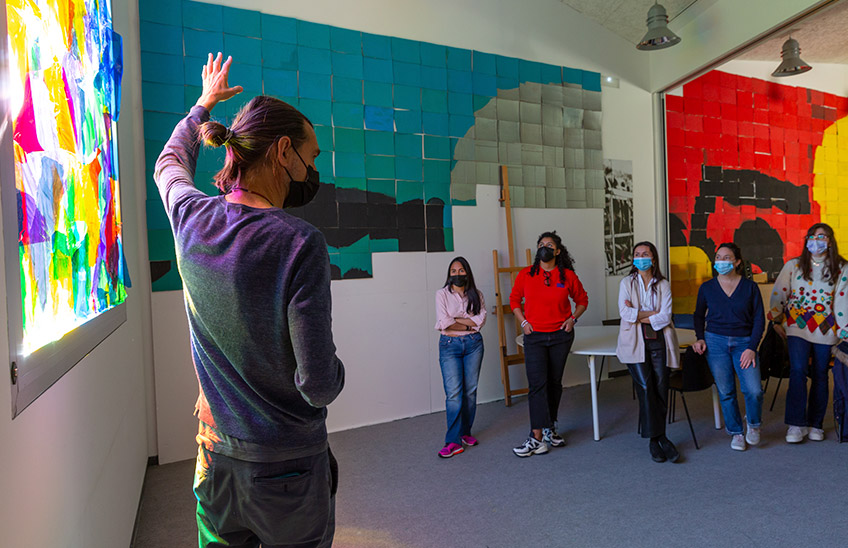In the artist's shoes: students of the Master in Curatorial Studies participate in a workshop with Daniel Canogar
The students of the IV promotion of the postgraduate course have culminated with this proposal the subject "The curator and the artist", in which they have made their own creations.

FotoManuelCastells/Artist Daniel Canogar gives one of the sessions of the workshop with students of the IV promotion of the Master in Curatorial Studies.
27 | 04 | 2022
The students of the IV promotion of the Master's Degree in Curatorial Studies at Museo Universidad de Navarra have culminated the subject "The curator and the artist" with a workshop in which they have put aside the role of curator to put on the shoes of the artist under the guidance of Daniel Canogar (Madrid, 1964). For four days the students have approached the role of the creator and devised their own proposals as a group. As Canogar explains, the workshop, which he is teaching for the third time in the postgraduate program, "invites participants, future curators, to put themselves in the artist's shoes, to get involved in the artistic process and understand the dynamics of conceptualization and then the execution of ideas and projects.
For him, it is "fundamental that they know what the work process is in order to understand this curatorial work. Sometimes the two fields are excessively separated, when in fact curatorial work is also creative and the artist must do curatorial work on his own projects. This is a way of bringing both fields together as part of the same artistic reality".
The course, with a workshop methodology, was structured in four days, with three parts each. At the beginning, Canogar gave a presentation in which different themes were worked on, based on his own work and that of other artists and phenomena of visual culture. Then, teams were formed to develop express artistic projects related to the issues raised. The event was closed with a common analysis of the results, commenting on the successes, pointing out what did not work well and debating on how to address the same issues from the different perspectives of the participants.
María Castella Piqueras, MCS student and Art History graduate from the University of Granada, emphasizes that the contribution of this workshop has been key to broaden her perspective: "My relationship with art has always been from the side of the viewer, the visitor. Discovering it through the eyes of the artist has been something new for me that has helped me reaffirm an idea: the revaluation of the role of artists in society. Art is not something secondary or dispensable, but it is necessary to rethink the way we approach it".
His colleague Celeste Garduño Carvajal, also an art historian from the Universidad Iberoamericana in Mexico City and curator at the Tlatelolco center of the Universidad Autónoma de México, values the experience very positively: "It has been incredible to be able to work and learn with an artist as renowned and well-traveled as Daniel Canogar. It has given us the opportunity to learn about his experience and trajectory, as well as to get to know one of the key points for curatorship and curatorial studies, such as the role of the artist". In this sense, she values that, "as curators in the contemporary context, one of the essential tasks is to have the ability to interact and work with artists of all kinds, for which having a sensitivity and approach to their work is fundamental. Sometimes we take a dangerous distance with the exhibited works, forgetting that there is a whole process, sensitivity and knowledge behind. Therefore, getting to know the other side of the artistic processes with this type of workshop enriches curatorial practices and the work of cultural management.
On the dynamics of the workshop and the topics covered, Garduño adds: "The first day we worked on the theme of colors and perspectives; the second day we analyzed the concept of ruins. On the third day, the workshop revolved around perceptions of the phantasmagoric. As a closing and final project, we explored the free theme, on concepts, emotions or ideas that affect us personally and socially today. In each session, original, striking and powerful creations emerged, both plastically and thematically, forming an artistic ensemble of which we all felt a part".